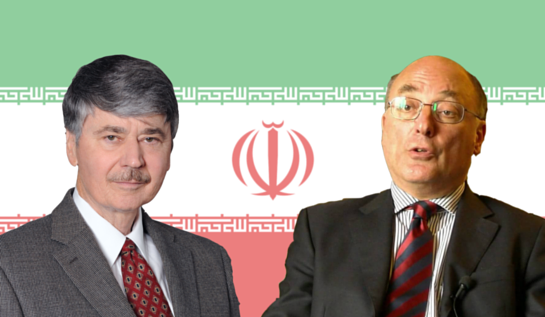Pardee School Professors on #IranDeal
Professors at the Frederick S. Pardee School of Global Studies at Boston University said that there was reason for cautious optimism on the news that a long-anticipated deal to curb Iran’s nuclear ambitions in exchange for loosened economic sanctions was reached on Tuesday, July 14.
“This is obviously a signal moment of accomplishment for Secretary Kerry and President Obama, but the key questions have to focus on the long term geopolitical consequences for the Middle East,” said Augustus Richard Norton, Professor of International Relations and Anthropology. “Iran is not going to shed either its ideology or its ambitions for hegemony in the Gulf, but the Vienna Agreement signals a willingness on the part of Europe and the United States to treat Iran as a normal state, a state with interests that both complement and confound US interests.”
The deal was announced early Tuesday morning, as President Obama addressed both the U. S. and Iran in a broadcast morning praising the deal and pledging to veto any legislation that the Republican-controlled Congress might use to prevent it.
“A great unknown is how the manifestation of this agreement will affect the internal social and political dynamics of Iran where many people do not share the anti-U.S. predilections of the regime,” Norton said. “Domestic U. S. politics will be fascinating to watch as well, not least because the signing of the agreement represents a significant failure for the hardline Israeli government and the supporting elements of the Israel lobby in the U.S. that has worked so hard to kill the deal and subvert the foreign policy of the Obama administration.”
Houchang Chehabi, Professor of International Relations and History, said that while the Vienna negotiations had been continuing for over 20 months, negotiations about Iran’s nuclear program went back for more than a decade.
“In the 1970s, after the revolutionary government came to power, they halted the country’s fledgling nuclear program on the grounds that it was a waste of money. Two reactors were about 70 percent finished, and they were left to rot,” said Chehabi, who was born in Tehran, Iran. “In the 1980s the government changed its mind, and decided Iran’s energy needs were such that it could not burn all its oil to fulfill them. They attempted to restart the program, but delays, financial concerns and the embargo meant that the power plants only started operating two years ago.”
According to the terms of the agreement reached between Iran and a consortium of six nations – the U. S., U. K., France, China, Russia and Germany – Iran would need to get rid of nearly all its enriched uranium and two-thirds of its centrifuges, as well as submit to international oversight of its facilities. At stake, Chehabi said, is the possiblity of using power-generation capabilities for generating weapons.
“Once you have a well-developed nuclear energy program, it’s a small step to nuclear weapons,” Chehabi said. “Nuclear weapons function as a deterrent to outside pressure on the regime. That’s the same reason we can’t effectively work against North Korea.”
An Iran with nuclear armaments could be a destablilizing force in the region. Benjamin Netanyahu, Prime Minister of Israel, has already referred to the deal as a ‘stunning historic mistake.’ Conservatives in the U. S. have also expressed opposition to the deal.
“The government of Saudi Arabia definitely will not be happy about a thaw between Iran and the West,” said Chehabi, referring to the tensions between the Sunni Muslim Saudi rulers and the Shia Muslim government in Iran. “And hardliners in Iran and elsewhere – those who see world politics not as national interest but as a struggle between good and evil – will be among those most unhappy. They were dragged into this negotiation kicking and screaming, and I wouldn’t be surprised if we see some attempts at sabotage.”
But many of the country’s moderates, as well as business minded conservatives, could applaud the deal.
“Despite patriotic pride in the nuclear power program among young people interested in democracy, many of them are looking forward to more economic opportunities, tourism, and ease of foreign travel which will be facilitated with the easing of sanctions,” Chehabi said. “The country has been incurring tremendous losses at every level due to these sanctions, but this was sort of acceptable as long as the price of oil was high. For years that has not been the case, and conservatives connected to the business sector are willing to compromise for the good of their country.”
Houchang Chehabi has taught at Harvard and has been a visiting professor at the University of St. Andrews, UCLA, and the Universidad Argentina de la Empresa. He has published two books, Iranian Politics and Religious Modernism: The Liberation Movement of Iran under the Shah and Khomeini (1990) and Distant Relations: Iran and Lebanon in the Last 500 Years (2006). Learn more about him here.
Augustus Richard Norton’s research experience in the Middle East spans nearly four decades, including residences in Bahrain, Egypt, Jordan, Kuwait and Lebanon. His current research interests include inter-sectarian relations in the Middle East, reformist Muslim thought, and strategies of political reform and opposition in authoritarian states. Learn more about him here.
FURTHER READING:
Dean Adil Najam Discusses Iran-U.S. Talks on VOA
Houchang Chehabi in Heute.de on U.S.-Iran Relations
